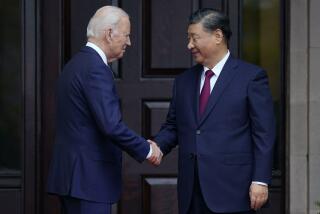Reagan Meets Li, Backs China Nuclear Pact
- Share via
WASHINGTON — President Reagan, returning to high-level diplomacy 10 days after undergoing cancer surgery, told visiting Chinese President Li Xiannian on Tuesday that he has approved a long-stalled U.S.-China nuclear cooperation agreement. Representatives of the two countries signed the pact later in the day.
Reagan endorsed the agreement, which will permit U.S. companies to compete for part of the business in China’s ambitious $6-billion nuclear power program, minutes before he welcomed Li in an abbreviated ceremony on the White House lawn. He told the Chinese leader of his decision during a subsequent half-hour meeting.
No New Promises
The pact, initialed 14 months ago during Reagan’s trip to China, was held up because of congressional concern that China might help Pakistan develop a nuclear bomb. Although Li brought no new promises, Reagan concluded that earlier Chinese commitments not to spread nuclear weapons technology are adequate.
“We are now satisfied that the Chinese have come forward with what we need to proceed on it,” White House spokesman Larry Speakes said.
Li, 76, is a former Chinese general and a survivor of the Chinese Communist Party’s Long March of the 1930s. Although the presidential post, which he has held since June, 1983, is largely ceremonial, he wields real political power as one of six members of the Standing Committee of the party Politburo.
Reagan, 74, sounded hoarse and appeared somewhat pale as he welcomed Li in a White House ceremony cut to about half of the normal 30-minute length. He and Li, also in frail health, stood through their national anthems but, departing from custom, sat for brief statements. Both skipped the entertainment portion of Tuesday night’s state banquet, retiring for the night after dinner.
Li’s visit came four days short of the 32nd anniversary of the end of the Korean War, the last time U.S. and Chinese troops faced each other in combat. Although the two countries remain far apart on issues ranging from human rights to economics, Reagan and Li stressed matters of agreement and glossed over differences.
Emphasizing China’s new policies of increased economic incentives, Reagan said: “The Chinese people are enjoying greater productivity and a rising standard of living.” He said that the United States stands ready to work with China as “friends and partners in enterprise.”
Li referred to Reagan’s cancer surgery in his own brief speech.
“Mr. President, I am very happy to see that you are recovering so fast, and I am deeply touched by your participation in this welcoming ceremony,” Li said.
Later, U.S. Cabinet officers and Chinese officials from Li’s delegation signed four agreements--the nuclear cooperation pact, a cultural-exchange protocol, a student-exchange agreement and a measure permitting Chinese fishermen to fish in U.S. waters. Only the nuclear agreement was controversial.
Cranston Voices Concern
Sen. Alan Cranston (D-Calif.), a leading critic of Administration moves to forge nuclear links with China, said that the reservations he first expressed about the pact after the President’s trip to China “still had not been erased” despite new Chinese assurances not to pass along technology or secrets to Pakistan.
China is not only a nuclear weapons power but a major exporter of nuclear technology in its own right, a State Department official noted. For years, China refused to adopt the same safeguards that the four other nuclear powers--the United States, the Soviet Union, Britain and France--have applied to prevent the proliferation of nuclear arms.
The official said that, as a result of its discussions with the United States over the cooperation pact, China had agreed to join the International Atomic Energy Agency and to apply the agency’s safeguards to nuclear exports.
U.S. law does not permit nuclear cooperation with any country that helps a non-nuclear power develop atomic weaponry. The officials said that China has made clear that it understands this element of U.S. law and has promised to abide by it.
More to Read
Sign up for Essential California
The most important California stories and recommendations in your inbox every morning.
You may occasionally receive promotional content from the Los Angeles Times.













